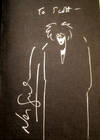
An Inquiry into the Nature and Causes of the Wealth of Nations. By Adam Smith, LL.D. and F.R.S. Formerly Professor of Moral Philosophy in the University of Glasgow. In Two Volumes.
by SMITH, Adam
- Used
- first
- Condition
- See description
- Seller
-
London, London, United Kingdom
Payment Methods Accepted
About This Item
London, Printed for W. Strahan; and T. Cadell, in the Strand, 1776. . First edition; 2 vols, 4to (31.5 x 24.5 cm); contemporary marginal annotations in pen, with half-title to vol. II, ad. for 'The Theory of Moral Sentiments' to title verso vol. I, publisher's ad. to vol. II 4F2 verso, errata vol. II [A2] verso, cancels vol. I M3, U3, 2Z3, 3A4 and 3O4, and vol. II D1 and 3Z4, vol. II p.288 misprinted 289; contemporary gilt-ruled sprinkled calf, rebacked but retaining original red and green morocco lettering-pieces, bottom and fore-edges untrimmed, wide margins (circa 6.5 cm), occasional spotting and soiling, minor marginal tears, mostly repaired, internal joints reinforced with tape; [12], 510; [4], 587, [1]pp; signatures: A4 a2 B-3T3 (bound without terminal blank); [A]2 B-4F2.
The first edition of the 'first and greatest classic of modern economic thought' (PMM). Smith (d.1790) spent ten years writing and perfecting The Wealth of Nations, the popularity of which surpassed its publisher's expectations upon release; the estimated supply of between 500 and 750 first edition copies was exhausted within the first six months of printing, and four further editions were issued within Smith's lifetime.
As the title explains, the work is fundamentally an investigation into what makes certain nations prosperous. Smith's originality lies in locating the roots of this comparative wealth in the specialisation of labour which had occurred in developed economies, for the 'annual labour of every nation is the fund which originally supplies it with all the necessaries and conveniencies of life which it annually consumes, and which consist always, either in the immediate produce of that labour, or in what is purchased with that produce from other nations' (Introduction).
Our copy with contemporary marginal annotations summarising Smith's arguments as the text progresses. These aides-mémoire include key observations such as the 'Principle of division = the propensity to exchange...' (p.16), and that 'labour is the real measure of exchangeable value' (p.35).
'The history of economic theory up to the end of the nineteenth century consists of two parts: the mercantilist phase which was based not so much on a doctrine as on a system of practice which grew out of social conditions; and the second phase which saw the development of the theory that the individual had the right to be unimpeded in the exercise of economic activity. While it cannot be said that Smith invented the latter theory... his work is the first major expression of it. He begins with the thought that labour is the source from which a nation derives what is necessary to it. The improvement of the division of labour is the measure of productivity and in it lies the human propensity to barter and exchange... Labour represents the three essential elementswages, profit and rentand these three also constitute income. From the working of the economy, Smith passes to its matter'stock'which compasses all that man owns either for his own consumption or for the return which it brings him. The Wealth of Nations ends with a history of economic development, a definitive onslaught on the mercantile system, and some prophetic speculations on the limits of economic control' (PMM).
ESTC T96668; Kress 7261; Rothschild 1897; PMM 221.
The first edition of the 'first and greatest classic of modern economic thought' (PMM). Smith (d.1790) spent ten years writing and perfecting The Wealth of Nations, the popularity of which surpassed its publisher's expectations upon release; the estimated supply of between 500 and 750 first edition copies was exhausted within the first six months of printing, and four further editions were issued within Smith's lifetime.
As the title explains, the work is fundamentally an investigation into what makes certain nations prosperous. Smith's originality lies in locating the roots of this comparative wealth in the specialisation of labour which had occurred in developed economies, for the 'annual labour of every nation is the fund which originally supplies it with all the necessaries and conveniencies of life which it annually consumes, and which consist always, either in the immediate produce of that labour, or in what is purchased with that produce from other nations' (Introduction).
Our copy with contemporary marginal annotations summarising Smith's arguments as the text progresses. These aides-mémoire include key observations such as the 'Principle of division = the propensity to exchange...' (p.16), and that 'labour is the real measure of exchangeable value' (p.35).
'The history of economic theory up to the end of the nineteenth century consists of two parts: the mercantilist phase which was based not so much on a doctrine as on a system of practice which grew out of social conditions; and the second phase which saw the development of the theory that the individual had the right to be unimpeded in the exercise of economic activity. While it cannot be said that Smith invented the latter theory... his work is the first major expression of it. He begins with the thought that labour is the source from which a nation derives what is necessary to it. The improvement of the division of labour is the measure of productivity and in it lies the human propensity to barter and exchange... Labour represents the three essential elementswages, profit and rentand these three also constitute income. From the working of the economy, Smith passes to its matter'stock'which compasses all that man owns either for his own consumption or for the return which it brings him. The Wealth of Nations ends with a history of economic development, a definitive onslaught on the mercantile system, and some prophetic speculations on the limits of economic control' (PMM).
ESTC T96668; Kress 7261; Rothschild 1897; PMM 221.
Reviews
(Log in or Create an Account first!)
Details
- Bookseller
- Shapero Rare Books
(GB)
- Bookseller's Inventory #
- 109201
- Title
- An Inquiry into the Nature and Causes of the Wealth of Nations. By Adam Smith, LL.D. and F.R.S. Formerly Professor of Moral Philosophy in the University of Glasgow. In Two Volumes.
- Author
- SMITH, Adam
- Book Condition
- Used
- Place of Publication
- London, Printed for W. Strahan; and T. Cadell, in the Strand, 1776.
- Note
- May be a multi-volume set and require additional postage.
Terms of Sale
Shapero Rare Books
30 day return guarantee, with full refund including original shipping costs for up to 30 days after delivery if an item arrives misdescribed or damaged.
About the Seller
Shapero Rare Books
Biblio member since 2020
London, London
About Shapero Rare Books
Specialising in rare books on Travel & Voyages, Natural History, Literature (including modern first editions), Children's Books, Guide Books, Judaica & Hebraica, titles of Russian interest, and Islamica.
Glossary
Some terminology that may be used in this description includes:
- Calf
- Calf or calf hide is a common form of leather binding. Calf binding is naturally a light brown but there are ways to treat the...
- Errata
- Errata: aka Errata Slip A piece of paper either laid in to the book correcting errors found in the printed text after being...
- Rebacked
- having had the material covering the spine replaced. ...
- Verso
- The page bound on the left side of a book, opposite to the recto page.
- Morocco
- Morocco is a style of leather book binding that is usually made with goatskin, as it is durable and easy to dye. (see also...
- First Edition
- In book collecting, the first edition is the earliest published form of a book. A book may have more than one first edition in...






